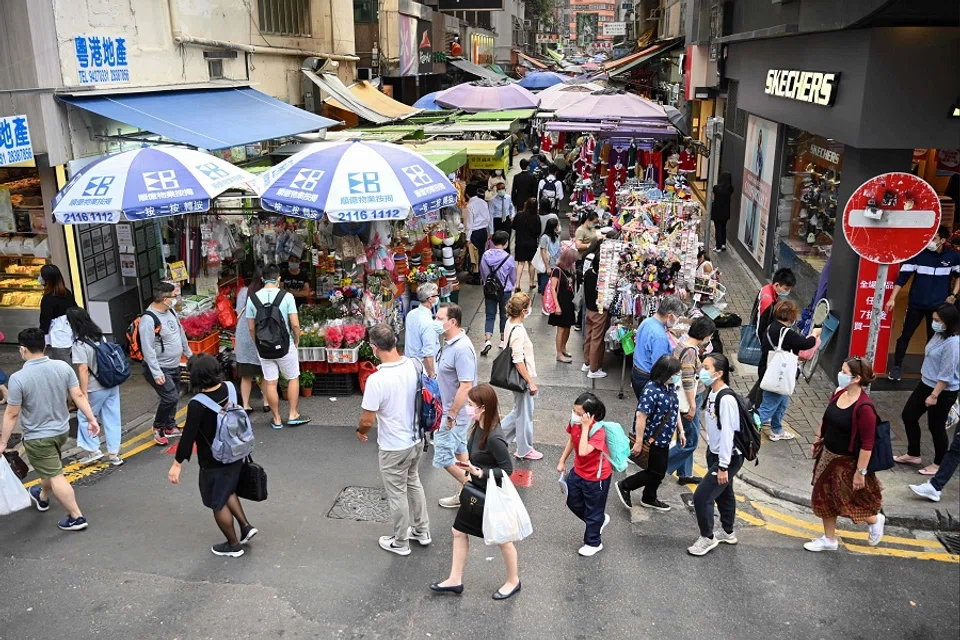Why Hong Kong is failing to stop the spread of Covid-19 again
During the SARS outbreak in 2003, the whole of Hong Kong came together to fight it. That unity is unfortunately gone now, says Tai Hing Shing. Without that spirit, even if the government bucks up and imposes even harsher measures, Hong Kong may need to brace itself for further waves of Covid-19.

There is a story in Greek mythology from Homer's Odyssey that speaks about Sisyphus pushing a boulder up a hill as a punishment from Zeus: "Bracing himself and thrusting with hands and feet, he pushed the boulder uphill to the top. But every time, as he was about to send it toppling over the crest, its sheer weight turned it back, and once again towards the plain the pitiless rock rolled down. So once more he had to wrestle with the thing and push it up..."
Unfortunately, Hong Kong's fight with the Covid-19 pandemic seems to be a re-enactment of the "Sisyphus tragedy". Over the past six months and more, waves of infections have hit Hong Kong - the situation has been worsening, improving and then worsening again in an endless cycle. For example, in late June, Hong Kong had zero local confirmed cases for over 20 consecutive days and was expected to reopen its border with mainland China soon after. But there was a surge in cases in early July, with dozens and even over 100 cases being reported each day. Just like that, Hong Kong faced a new wave of Covid-19 infections.

A never-ending cycle
It was not until late November that the Covid-19 situation in Hong Kong subsided again, with zero cases, and also zero community cases reported over a few consecutive days. Just when many people were hopeful in finally overcoming the pandemic, a dance hall outbreak sparked another huge wave of infections in various parts of Hong Kong, marking the early arrival of the fourth Covid-19 wave in winter. Hong Kongers are once again anxiously fighting against the pandemic.
However, having fought against the pandemic for ten months, many Hong Kongers do not have much faith in the current pandemic measures.
Due to the severity of the pandemic, Hong Kong Chief Executive Carrie Lam announced stricter pandemic measures during a press conference on 30 November. They included tighter restrictions on opening hours and the number of diners at restaurants. Civil servants would also be asked to work from home. However, having fought against the pandemic for ten months, many Hong Kongers do not have much faith in the current pandemic measures.
Many of my friends lamented after watching the press conference yesterday that even if the current wave gradually subsides following the implementation of various measures, it is still highly likely that a fifth or sixth Covid-19 wave could hit Hong Kong. Based on their tone, it seems like they are prepared to lose the fight and are counting their days of agony living under the pandemic. It is as if they have lost all hope in overcoming it.

Why has Hong Kong's fight against the pandemic been so unsatisfactory?
As a Chinese saying goes, "no matter how capable a woman may be, if she does not have rice, she can't cook" (巧妇难为无米之炊) - the smooth execution of a policy is inseparable from manpower, resources, and financial support. But if we look back at Hong Kong's journey battling the pandemic, its failure to eradicate the virus seems to be unrelated to resources.
... many common-sense measures that Hong Kongers take for granted are in fact overlooked by government officials when coming up with policies, because they are so out of touch with the ground.
Government policies partly to blame
Taking the example of the much talked about Covid-19 Universal Community Testing Programme in the middle phase of the pandemic, the Hong Kong SAR government was short of manpower and equipment then. However, with the full support of Beijing's central government, over 500 support team members were sent to Hong Kong in early September to help in the city's mass testing programme, offering free testing services that helped relieve Hong Kong's pandemic situation for a time.
As such, to some extent, Hong Kong's inability to shake off the pandemic has to do with policy errors by its government. It seems the Hong Kong government is still in the bad habit of only addressing immediate problems - each time, it only reacts after a coronavirus breaks out rather than taking preventive measures.
Even more surprisingly, many common-sense measures that Hong Kongers take for granted are in fact overlooked by government officials when coming up with policies, because they are so out of touch with the ground. For example, ships' crew, airline crew, and diplomats are allowed to enter Hong Kong without having to serve a mandatory quarantine; and, while there are designated hotels for quarantine, people serving quarantine are not restricted from meeting others who are non-quarantined, so the coronavirus spreads beyond the hotel, leading to the current situation going out of control.
Furthermore, after nearly a year of fighting the pandemic, even cooperative Hong Kongers are starting to show pandemic fatigue.
No longer united people of Hong Kong
However, the biggest problem with Hong Kong's pandemic efforts is the disunity of Hong Kongers. It goes without saying that the most important thing in handling a pandemic is trust and cooperation between the people and government, with everyone coming together to fight the pandemic. During the SARS outbreak in 2003, the whole of Hong Kong came together to fight it. That spirit of self-help is still talked about today.
Unfortunately, amid the political chaos of the past year or so, that spirit is all gone. Many Hong Kongers do not trust the government and are not following pandemic measures, and are even pointing fingers at one another, making it hard for Hong Kong to move ahead in fighting the pandemic.

Early this year when the pandemic first broke out, the government was hesitant to close its borders completely, and some Hong Kongers linked pandemic efforts to political tussles, and criticised the authorities for acting out of political considerations to do with mainland-Hong Kong relations, rather than scientific or medical considerations. Subsequently, the central government sent officials to Hong Kong to help handle the serious outbreak, and the pan-Democratic supporters became worried that Beijing was collecting Hong Kongers' DNA and sending it to mainland China in the name of pandemic control. The pandemic efforts did not work well in the end.
Furthermore, after nearly a year of fighting the pandemic, even cooperative Hong Kongers are starting to show pandemic fatigue. When the pandemic is bad, they are slightly more aware and obey government measures, but once the cases go down they slacken and start to go out for meals and leisure, making it easy for the virus to spread in the community.
So, even though the current situation in Hong Kong is not totally out of control like in Europe and the US, due to the gaps in preventing imported cases, the chain of local spread remains unbroken, leading to a cycle of tightening and relaxing of measures, with no end in sight.
If the "targets" of government policies agree with these policies, it is then possible for these policies to be fully effected. If not, policy implementation will be impeded. This is the big problem that Hong Kong is facing now in its pandemic efforts. A pessimist would say that if Hong Kongers do not self-reflect and come together to fight the pandemic, even if the government rolls out stricter, more targeted measures to plug existing gaps, Hong Kong will not be able to beat the pandemic, but will have to continue its Sisyphean efforts until a vaccine hits the market.



![[Photos] Fact versus fiction: The portrayal of WWII anti-Japanese martyrs in Taiwan](https://cassette.sphdigital.com.sg/image/thinkchina/3494f8bd481870f7c65b881fd21a3fd733f573f23232376e39c532a2c7593cbc)

